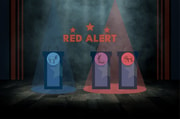Memo Published June 10, 2024 · 6 minute read
The Data: How Third Parties Could be Spoilers that Elect Trump
Third Way
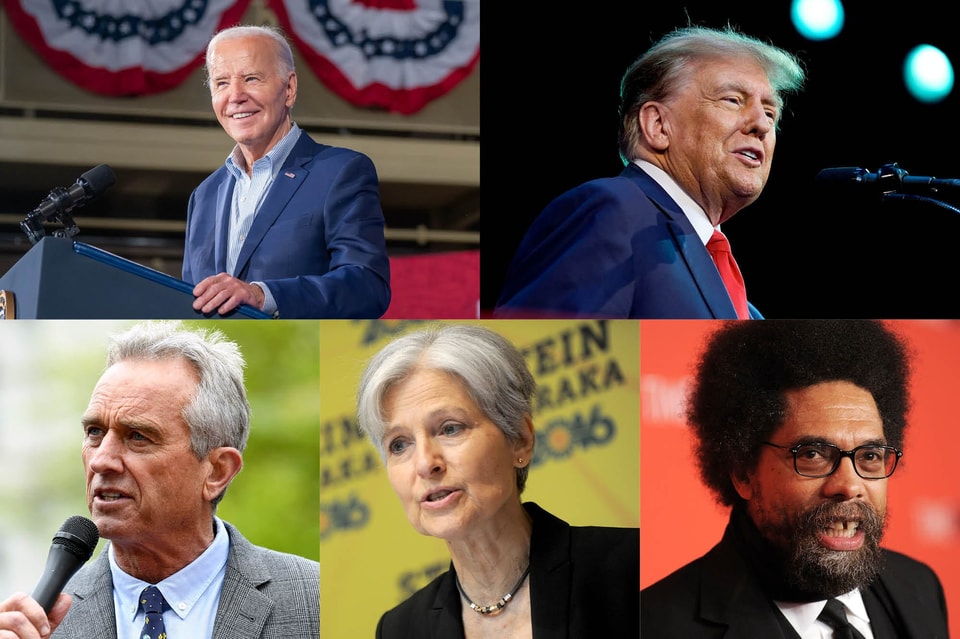
Third parties could be the decisive factor in the 2024 presidential election, ushering in a catastrophic second Donald Trump presidency. The third-party vote has cost Democrats twice in the last six presidential elections, and the current crop of third parties is stronger than they were in 2016 or 2020. It is therefore vital that everyone in the anti-Trump coalition be prepared to confront that threat in 2024.
The polling this early is extremely fluid and far too blunt an instrument to know whether the leading third-party candidate, RFK Jr., will take more votes in critical battleground states from Trump or Biden. But there is ample reason for Democrats to believe that RFK Jr., along with Jill Stein, and others, pose a bigger threat to Biden than to Trump.
Third party candidates do not win.
There is no historical precedent for victory. All the third-party candidates in the last century combined haven’t received enough electoral votes to win a single election. In fact, no third-party candidate has received even a single electoral vote in more than 50 years. The last two candidates to gain a single electoral vote ran explicitly racist campaigns.
Spring polling of third parties is a mirage. RFK Jr. is averaging 10% in the polls, and history suggests this support level will only drop. Third parties consistently peak in the spring, with support plummeting as voters learn more about their choices. In 1980, John Anderson polled at 21% in May, but he garnered just 6.6% of the eventual popular vote. Perot managed just 19% of the vote in 1992—20 points lower than his peak poll in late spring and didn’t win a single electoral vote.
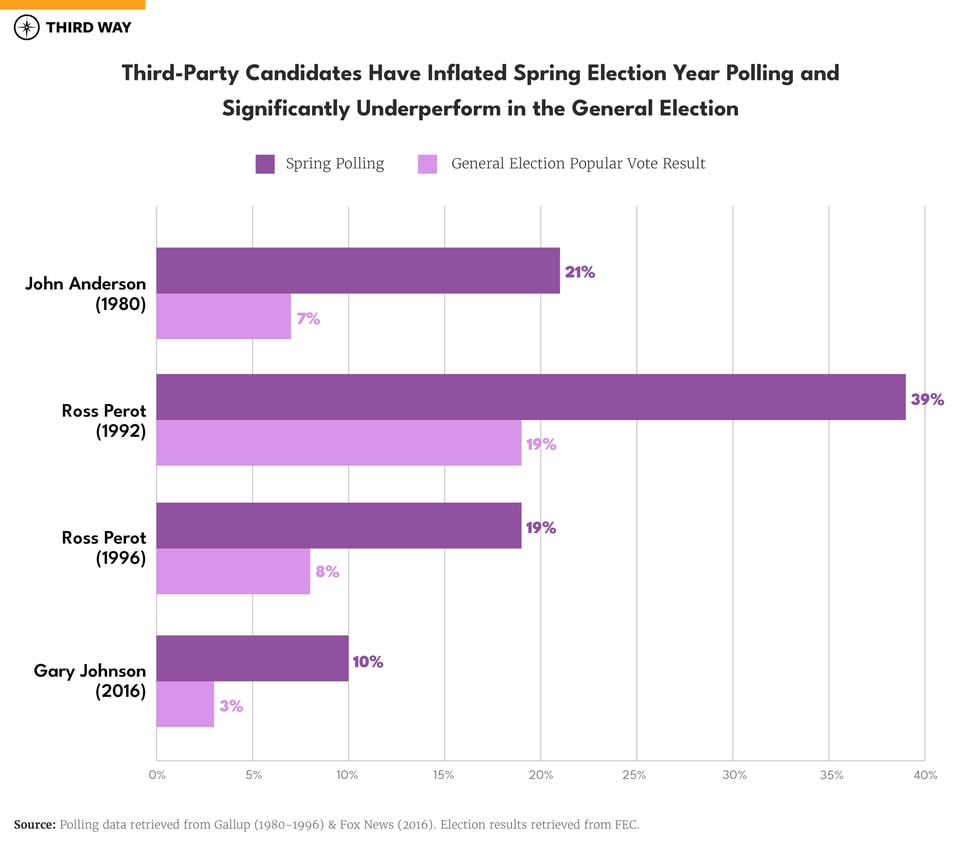
Dissatisfaction with the major parties has never predicted third-party success. Voter dissatisfaction with the major parties is close to the historical average. The high water mark for openness to a third party was in 1992, when 59% said they would consider other choices. That didn’t foreshadow a Perot Administration; he finished 40 points lower than the CBS poll finding on openness. Voters today are about as dissatisfied with Biden and Trump as they were in 2008 with McCain and Obama. And, despite Reagan’s eventual romp, it’s where the candidates were in 1980.
Third parties are dividing the anti-Trump coalition.
There are more soft partisans in Biden’s coalition than Trump’s coalition. YouGov/Economist polling shows that 64% of Trump’s supporters view him “very favorably,” while less than half of Biden’s supporters view him “very favorably.” Similarly, Third Way’s polling has found that Biden’s voters are 13 percentage points more likely to consider voting for a third party than Trump’s voters. While Biden has a higher ceiling, with his possible vote totals well north of 50%, Trump has a stronger floor: his voters are more loyal, so third parties are less likely to draw them away.
Kennedy and third parties are drawing from critical voters who backed Biden in 2020. Aggregated polling from April 2024 shows RFK Jr. currently performing best in a multi-candidate race with independents (Biden won them by 15 points in 2020), moderates (Biden won them by 26 points in 2020), and young voters (Biden won them by 25 points in 2020).
Third parties could siphon “double haters” from Biden. Double haters (voters who don’t like either major party candidate) represent about 20 percent of the electorate at the moment. In 2020, Biden won “double haters” by 15 points (47-32%). Third Way’s most recent polling of double haters shows that Biden has just a two-point lead over Trump among double haters—and a 32% plurality of double haters are voting for Kennedy, with another 11% going for Jill Stein and Cornel West.
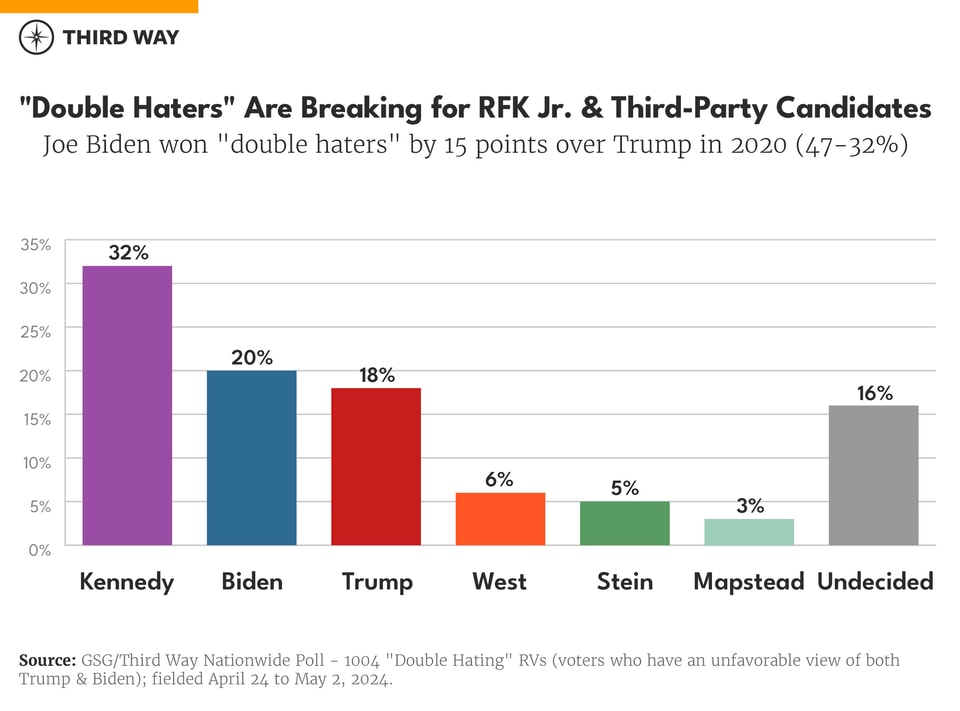
They will help Trump win the battlegrounds…
Third parties were key to Trump’s victory in three Blue Wall states in 2016. Third parties captured less than 5% of the vote but gave Trump wins in Michigan and Wisconsin with 48% of the vote and in Pennsylvania with 49%. Remarkably, Trump’s vote totals and even his share of the vote rose from 2016 to 2020 in all three states. But Biden won them because his share (relative to Clinton’s) rose more without third parties on the ballot.
Donald Trump could have won five battlegrounds and the White House in 2020 with third parties on the ballot. Biden won 2016 third-party voters by a 30-point margin, and they were decisive in flipping five battleground states blue. Without third-party voters breaking for Biden, Trump likely would have won Arizona, Georgia, Wisconsin, and the presidency.
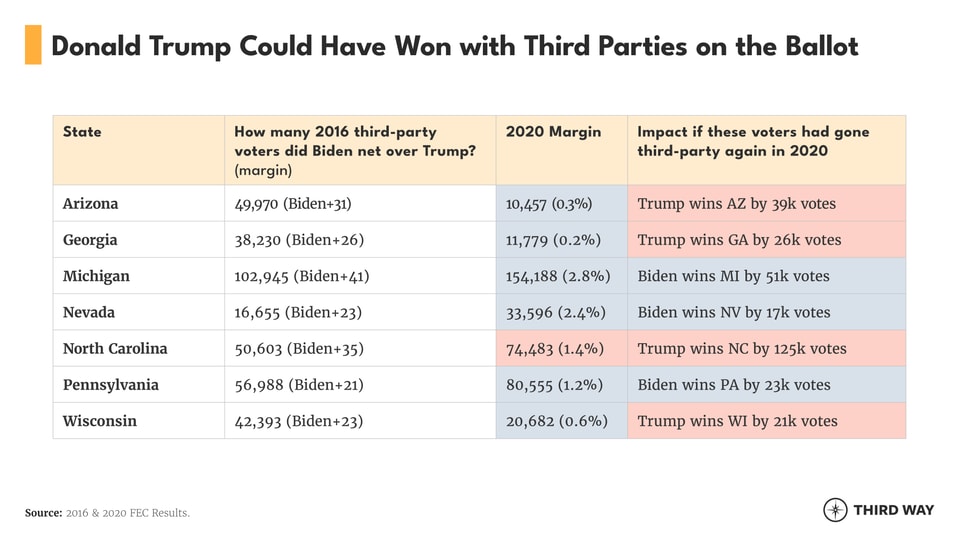
Recent Wisconsin polling shows third parties could turn a Biden lead in a two-way race into a virtual tie. A recent Quinnipiac poll of WI shows that a Biden 6-point lead drops to just a 40-39% lead over Trump when third-party candidates are introduced, with RFK Jr. taking 12%, Stein taking 4% and West getting 1%.
That’s why the MAGA far-right is rooting for third party spoilers to help Trump. Steve Bannon, Charlie Kirk, and Megyn Kelly are cheering on Stein and others. To wit, Kelly: “Go, Jill, go! You go sister! Green!” Kirk added, “If the Green Party would have been on the ballot [in 2020], Donald Trump would still be President.” And Trump believes Kennedy will throw the election to him: “[RFK Jr.] is going to be taking votes from Crooked Joe Biden, which would be a great service to America.”
…So Democrats must aggressively confront the threat.
The good news: The Democratic coalition can move soft Biden voters away from third parties with effective messaging. Nearly half of voters are not aware of Kennedy’s most extreme claims that vaccines cause autism and his belief that COVID was targeted to attack certain races. As a Monmouth poll found, “Biden-Trump double haters are less likely than other voters to have previous knowledge of Kennedy’s positions on these issues (40% aware) and more likely to soften their support after hearing about them (dropping to 26% from an initial potential vote level of 38%).” And research from Sarah Longwell suggests the voters most likely to be turned off by Kennedy’s far-right positions belong to the Biden camp.
And there’s time: Most voters haven’t tuned into the presidential race. A Quinnipiac poll showed that 31% of voters hadn’t heard enough about RFK Jr. to form an opinion of him, while 69% said this about Stein and 71% about West. The urgent task for Democrats over the next six months is to make sure that soft Biden voters know about RFK’s disqualifying record and sound the alarm that he is playing for the Red team.
